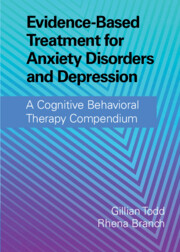 Evidence-Based Treatment for Anxiety Disorders and Depression
Evidence-Based Treatment for Anxiety Disorders and Depression Book contents
- Evidence-Based Treatment for Anxiety Disorders and Depression
- Evidence-Based Treatment for Anxiety Disorders and Depression
- Copyright page
- Contents
- Figures
- Tables
- Contributors
- 1 Introduction
- 2 The History and Philosophical Underpinnings of CBT:
- Part One Cognitive Behavioral Therapy for Anxiety Disorders
- Part Two Cognitive Behavioral Therapy for Posttraumatic Stress Disorder
- Part Three Cognitive Behavioral Therapy for Obsessive-Compulsive Disorder and Associated Disorders
- 11 Obsessive-Compulsive Disorder:
- 12 CBT for OCD:
- 13 Obsessive Compulsive Disorder:
- 14 Other Specified and Unspecified Obsessive-Compulsive and Related Disorders
- 15 A Cognitive Behavioral Approach to Body Dysmorphic Disorder:
- 16 Comprehensive Behavioral Treatment for Trichotillomania (Hair Pulling Disorder) and Excoriation (Skin Picking) Disorder
- 17 Cognitive Behavioral Therapy for Hoarding Disorder
- Part Four Cognitive Behavioral Therapy for Depression
- Part Five Complexity and Comorbidity in Anxiety Disorders and Depression:
- Part Six Specialist Applications of Cognitive Behavioral Therapy for Anxiety Disorders and Depression
- Part Seven Future Developments
- Appendices
- Index
- References
14 - Other Specified and Unspecified Obsessive-Compulsive and Related Disorders
from Part Three - Cognitive Behavioral Therapy for Obsessive-Compulsive Disorder and Associated Disorders
Published online by Cambridge University Press: 06 January 2022
- Evidence-Based Treatment for Anxiety Disorders and Depression
- Evidence-Based Treatment for Anxiety Disorders and Depression
- Copyright page
- Contents
- Figures
- Tables
- Contributors
- 1 Introduction
- 2 The History and Philosophical Underpinnings of CBT:
- Part One Cognitive Behavioral Therapy for Anxiety Disorders
- Part Two Cognitive Behavioral Therapy for Posttraumatic Stress Disorder
- Part Three Cognitive Behavioral Therapy for Obsessive-Compulsive Disorder and Associated Disorders
- 11 Obsessive-Compulsive Disorder:
- 12 CBT for OCD:
- 13 Obsessive Compulsive Disorder:
- 14 Other Specified and Unspecified Obsessive-Compulsive and Related Disorders
- 15 A Cognitive Behavioral Approach to Body Dysmorphic Disorder:
- 16 Comprehensive Behavioral Treatment for Trichotillomania (Hair Pulling Disorder) and Excoriation (Skin Picking) Disorder
- 17 Cognitive Behavioral Therapy for Hoarding Disorder
- Part Four Cognitive Behavioral Therapy for Depression
- Part Five Complexity and Comorbidity in Anxiety Disorders and Depression:
- Part Six Specialist Applications of Cognitive Behavioral Therapy for Anxiety Disorders and Depression
- Part Seven Future Developments
- Appendices
- Index
- References
Summary
This chapter aims to give an overview of what cognitive behavioral therapy (CBT) has to offer in the treatment of several DSM-5 “other specified” obsessive-compulsive and related disorders (OCRDs): obsessional jealousy, body-focused repetitive behavior disorders – not otherwise specified (e.g., repetitive nail biting), body dysmorphic disorder with a visible defect, and olfactory reference syndrome. Issues in diagnosis, assessment, formulation, and treatment are considered, with an emphasis on ready translation into clinical practice. We reflect not just on how traditional CBT approaches can be tailored to the unique features of each condition but also on the application and integrative potential of newer approaches, such as from the “third wave” and inference-based therapy.
Keywords
- Type
- Chapter
- Information
- Evidence-Based Treatment for Anxiety Disorders and DepressionA Cognitive Behavioral Therapy Compendium, pp. 269 - 294Publisher: Cambridge University PressPrint publication year: 2022
